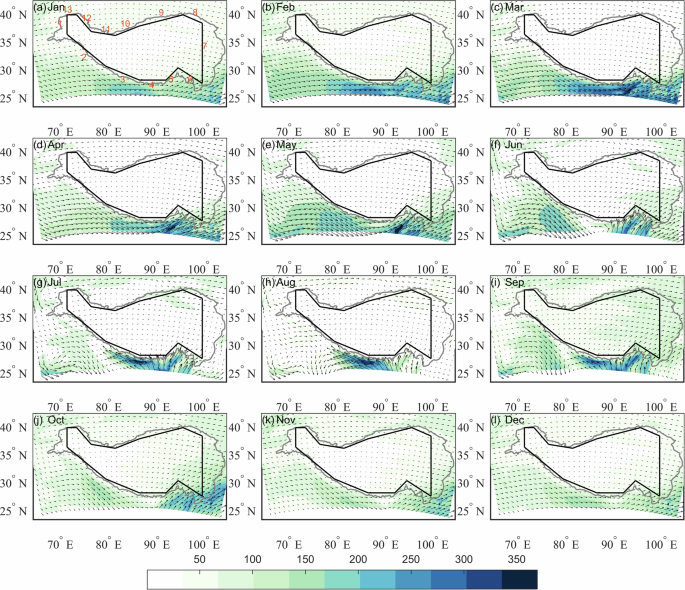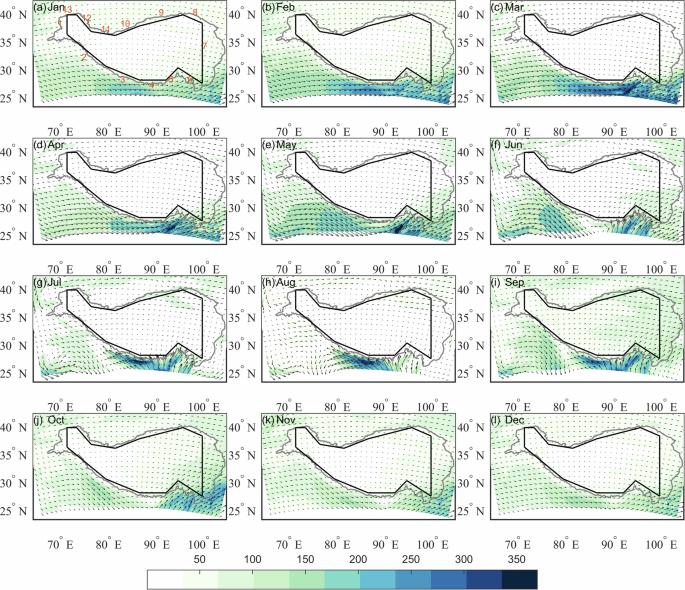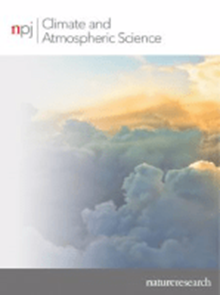从 33 个 CMIP6 模型评估青藏高原的大气水汽输送情况
IF 8.5
1区 地球科学
Q1 METEOROLOGY & ATMOSPHERIC SCIENCES
引用次数: 0
摘要
大气水汽输送是调节青藏高原水资源的关键。随着人们对气候变化的日益关注,了解青藏高原大气水汽输送的演变变得越来越重要。然而,在 CMIP6 模式中,人们对这种输送的时空差异仍然知之甚少。在这里,我们对 33 个 CMIP6 模型模拟的历史大气水汽输送进行了全面评估,利用一种新方法评估了模型模拟在复制热带潮湿带区域大气水汽输送方面的准确性。结果表明,CMIP6 模式总体上成功地再现了大气水汽输送的广泛空间模式。然而,在季风时期出现了很大的误差,主要原因是模拟的印度夏季季风的位置、移动和强度不准确。较粗的分辨率和对物理过程的表述不清,是造成在季风区大气水汽输送模拟中出现误差的潜在原因。由于未能模拟地形对大气水汽输送的阻挡,加剧了这些缺陷,从而导致显著差异。在我们调查的 33 个 CMIP6 模式中,超过三分之一在这方面存在严重缺陷。虽然更粗糙的分辨率和地形重力波是可信的因素,但它们并不能完全解释本研究获得的所有结果。模型中使用的地形数据不够详细或不准确,也可能是造成这一缺陷的原因。本研究强调,必须使用经过严格评估的模型来制定有效的青藏高原区域适应战略。本文章由计算机程序翻译,如有差异,请以英文原文为准。


Evaluation of atmospheric moisture transport to the Tibetan Plateau from 33 CMIP6 models
Atmospheric moisture transport is pivotal in regulating water resources over the Tibetan Plateau (TP). With the growing concerns about climate change, understanding the evolution of atmospheric moisture transport over the TP has become increasingly critical. however, the spatiotemporal distinctions of this transport remain poorly understood in the CMIP6 models. Here, we conducted a comprehensive evaluation of simulated historical atmospheric moisture transport from 33 CMIP6 models, utilizing a novel methodology that assesses the accuracy of model simulations in replicating regional atmospheric moisture transport over the TP. Our results indicate that the CMIP6 models generally succeed in reproducing the broad spatial patterns of atmospheric moisture transport. Nonetheless, substantial errors occur during the monsoon period, primarily attributable to inaccuracies in the location, movement, and intensity of the simulated Indian summer monsoon. The coarser resolution and poor representation of physical processes are potential reasons for errors in atmospheric moisture transport simulation over the TP. The Failure to simulate the terrain blocking on atmospheric moisture transport exacerbates these deficiencies, leading to significant discrepancies. Of the 33 CMIP6 models we investigated, over one-third displayed serious deficiencies in this regard. While coarser resolution and orographic gravity waves are plausible factors, they do not fully account for all the results obtained in this study. Insufficiently detailed or inaccurate topographic data used in the models may also contribute to this deficiency. This study highlights the necessity of using rigorously evaluated models to develop effective regional adaptation strategies over the Tibetan Plateau.
求助全文
通过发布文献求助,成功后即可免费获取论文全文。
去求助
来源期刊

npj Climate and Atmospheric Science
Earth and Planetary Sciences-Atmospheric Science
CiteScore
8.80
自引率
3.30%
发文量
87
审稿时长
21 weeks
期刊介绍:
npj Climate and Atmospheric Science is an open-access journal encompassing the relevant physical, chemical, and biological aspects of atmospheric and climate science. The journal places particular emphasis on regional studies that unveil new insights into specific localities, including examinations of local atmospheric composition, such as aerosols.
The range of topics covered by the journal includes climate dynamics, climate variability, weather and climate prediction, climate change, ocean dynamics, weather extremes, air pollution, atmospheric chemistry (including aerosols), the hydrological cycle, and atmosphere–ocean and atmosphere–land interactions. The journal welcomes studies employing a diverse array of methods, including numerical and statistical modeling, the development and application of in situ observational techniques, remote sensing, and the development or evaluation of new reanalyses.
 求助内容:
求助内容: 应助结果提醒方式:
应助结果提醒方式:


